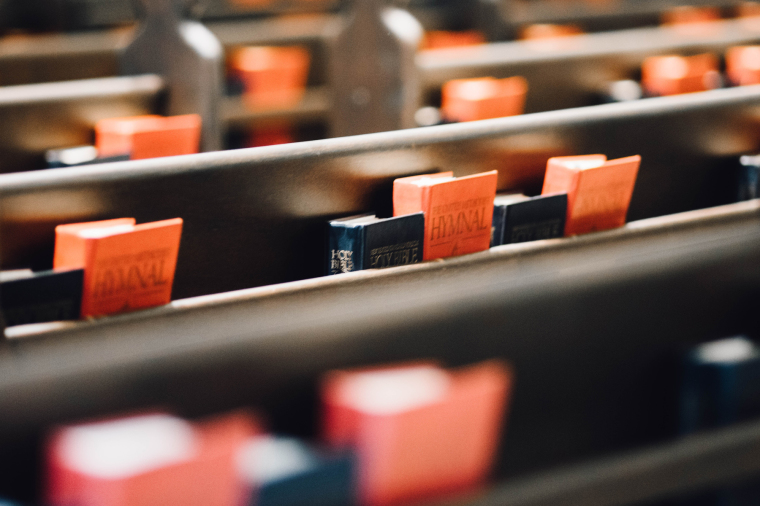
First published November 14, 2014
Eight years ago I attended an Anglican church for the first time. As a Baptist pastor's daughter I was suddenly transplanted into a church community where men sometimes wear dresses, people sprinkle water on babies' heads, drink real wine at communion, and recite familiar phrases aloud together during their services.
Despite growing up in church pews there was still so much that was mysterious: who were the Vestry and what did they do? Would I ever know the words to The Grace off by heart? Would they still give me communion if I didn't cup my hands just right?
Full disclosure: I never expected to find life within the walls of an Anglican church, much less a flourishing, growing faith within what I misunderstood to be a dying denomination.
This year marks a pause in my Anglican journey. My family is part of a new (non-Anglican) church plant a bit closer to our local community and the distance has caused me to consider the ways God used the Anglican Church to teach me and develop my faith.
Don't worry Baptists—I'm not about to mark down 'Anglican' on my census form just yet!
During the past eight years I have visited a number of different Anglican churches in both a professional and personal capacity. I have also had opportunity to observe some of the more political aspects of the church structure. During this time I saw some things that resonated with me and some things that did not.
This list recognises God's ability to use different denominations to nurture believers. This is also based on my experience. I recognise others will have different perspectives.
Here are a few of the things I learnt during my time as an honorary Anglican:
The encouragement of being part of something bigger
A sense of belonging is important to Anglican Christians. For some this is a desire to remain traditional in practice—the songs they sing, the phrases they repeat and the way they conduct their services. For others it is a desire to hold fast to the core beliefs and doctrine as expressed in the Thirty Nine Articles. For many belonging also comes with shared identity and solidarity with Anglicans worldwide.
While there may be many small and aging Anglican churches in a post-Christian country like New Zealand, the Anglican Church is growing rapidly in many non-Western countries. Some figures state that more than 80 percent of Anglicans live in the Global South with estimated congregants numbering in the millions!
I now find it easier to grasp what it means to be part of the picture of the Great Multitude standing before God in Revelation chapter seven. Being part of the Anglican Church has helped me to understand more clearly what it looks like for a global Church to be the body of Christ—each with a special and vital function.
The Anglican Church is structured in a way that allows for a greater awareness of the denomination's global scale. I would argue that this sense of oneness and shared identity is something Christians in more autonomous congregations sometimes lack.
The importance of the Bible
The Thirty Nine Articles are historically defining statements affirming the various beliefs of the Church of England. Staying true to these is considered very important for many in the Anglican Church. One of these statements affirms 'sufficiency of the Holy Scriptures for salvation'.
At every Anglican church I attended I saw at least two passages read aloud with clarity. Some churches even stood up out of reverence for the gospel reading. Practically I appreciated the way the Bible was acknowledged and built into structures and traditions.
I was encouraged to love and understand the Bible. God's word guided me as I made important life decisions. Scripture comforted me when I was in despair. The Bible answered my doubts and illuminated the darkness of life.
I noticed that the Anglican churches that had confidence in the sufficiency of God's word were also churches with full pews, committed members and a vibrant sense of faith. It was obvious that understanding the Bible helped people to know God, grasp the fullness of the gospel and serve wholeheartedly.
The beauty of liturgy
In an Anglican context liturgy is the set structure of a church service and typically involves one person (usually a minister) reading out statements and the congregation responding—verbally, in silent prayer and by standing and/or kneeling at certain points.
I confess I was not an immediate fan of this rather repetitive and often monotonous-sounding practice!
But it grew on me.
Words and phrases began to jump out as I read them afresh. Each time I was reminded of who God is and who I am before him. Each time I remembered Christ and his death and resurrection. With each step, pause, word and phrase I was recalling the gospel—the power by which I have been saved.
I began to see the beauty in recalling God's goodness. I began to see the comfort in reciting familiar words and actively telling my soul the truth. I began to take refuge in the familiar repetition of ritual.
The Anglican liturgy reminds me that repetition can help me to recall the good God has done. It reminds me that there can be beauty in disciplining myself to say aloud the truths of my faith.
Moving on
I'd like to dedicate this piece to all my good friends and teachers at St John's Latimer Square for their input over the past eight years. God used each of you to have a profound impact on my life. After all, the heart of the Anglican Church is not a collection of old buildings (at least not in Christchurch!) but a group of committed Christians seeking to serve God, his world and each other.
I never did figure out exactly what the vestry does, or understand why men sometimes wear dresses (sorry—'vestments'), or come to agree with sprinkling water on babies' foreheads. But I am thankful for all the wonderful teaching, encouragement and life I found within the Anglican Church.

Sophia Sinclair's previous articles may be viewed at http://www.pressserviceinternational.org/sophia-sinclair.html